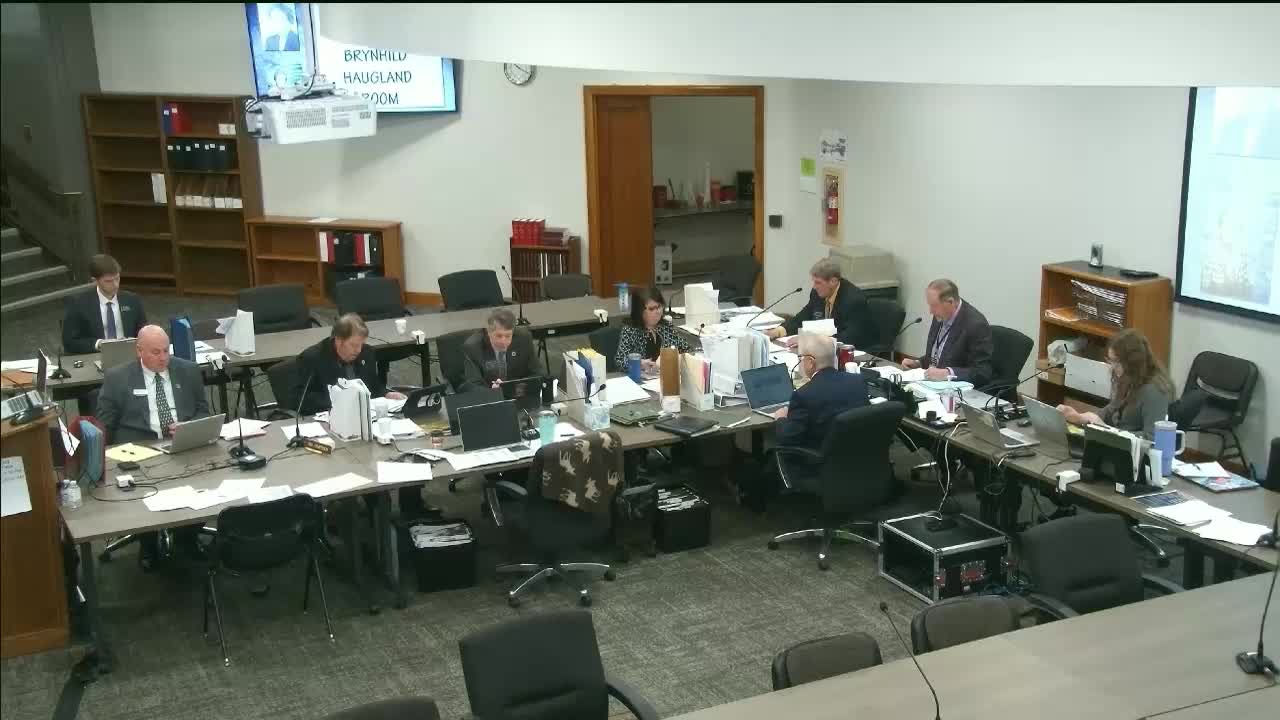Panel approves adjutant general and emergency services budget, including $39 million STORM federal grant and multiple SIF allocations
Get AI-powered insights, summaries, and transcripts
Subscribe
Summary
Representative Brandenburg presented amendment 25016001001 to House Bill 1016, combining the Adjutant General and Department of Emergency Services budgets; the committee approved the amendment and recommended do-pass, adding federal carryovers and SIF appropriations for training facilities and disaster programs.
Representative Brandenburg presented amendment 25016001001 to House Bill 1016, which combines the budgets of the Adjutant General and the Department of Emergency Services. The committee adopted the amendment and gave the bill a do-pass recommendation after a roll-call vote.
Brandenburg told the committee the adjutant general portion totals roughly $139,214,000 in all funds, with about $118 million coming from other (primarily federal) funds and roughly $20 million from the general fund. The Department of Emergency Services portion was presented with totals near $205,000,000 in all funds, including large disaster-grant and radio communications lines. The combined bill total was described in the amendment materials as about $345,000,000, with a general fund total of $30,652,000 and 236 FTEs; Brandenburg said the amendment adds three FTE positions.
Major one-time and carryover items discussed included a $34 million federal grant for the Camp Grafton Regional Training Institute; a federal carryover of $3.6 million for a Bridge Training Site at Camp Grafton; $5.8 million in federal funds tied to the Dickinson Readiness Center; and a $2 million federal carryover for a Camp Grafton fitness facility. Brandenburg said the amendment provides legislative authority to accept and spend those federal awards.
Brandenburg and staff also described SIF (appearing in the amendment as SIF or CIFF in committee discussion) allocations: $4.5 million in SIF for critical infrastructure state-matching grants, $2.5 million in SIF for the Williston Readiness Center, and SIF support for radio-network upgrades and siren costs (figures described in committee remarks included $525,000 and $495,000 for radio-related items). The amendment also includes SIF funding referenced for Civil Air Patrol equipment or radio needs; committee discussion recorded an initial misstatement of that figure (presenter briefly misstated it as $206,000,000) and then acknowledged the line as $206,000 in the record.
On disaster-relief programming, Brandenburg described a $39,050,000 federal STORM (Safeguarding Tomorrow through Ongoing Risk Mitigation) grant listed in the amendment; he said the federal share is about $35.5 million with $3.55 million from the state disaster relief fund to provide a 90/10 or similar match structure, and an additional state disaster-relief match of $3,000,000 was discussed in the worksheet. Brandenburg described STORM as a federal disaster-mitigation program paired with state matching authority and used the example of small-city flood repairs that could be financed through a low-interest repayable mechanism administered with the Bank of North Dakota.
Representative Campbell questioned a $124,046 reduction to special assessments; Jennifer Shee, chief for fiscal and administrative services, said the agency has paid off several special assessments in the current biennium so the base budget no longer needs those funds.
Committee staff and Brandenburg also described a package of federal grants and carryovers totaling tens of millions for armory repairs, recruiting and retention, training facilities and equipment. The amendment allows the Adjutant General and emergency services to accept federal awards already approved by emergency commissions and to spend certain SIF dollars for infrastructure matching and radio/siren upgrades.
Representative Bremberg moved to attach the amendment (seconded by Representative Bosch); the motion carried on roll-call. Representative Brandenburg then moved House Bill 1016 for a do-pass as amended; the motion was seconded by Representative Meyer and carried on a recorded vote. The committee finished its work on House Bill 1016 and will forward the amended bill for further consideration.
Committee discussion flagged that the budget covers two distinct programmatic areas — the National Guard and state emergency services — and that committee members and the full body may request additional acronyms and program explanations (for example, the STORM program) when the bill reaches full committee and later the floor.
